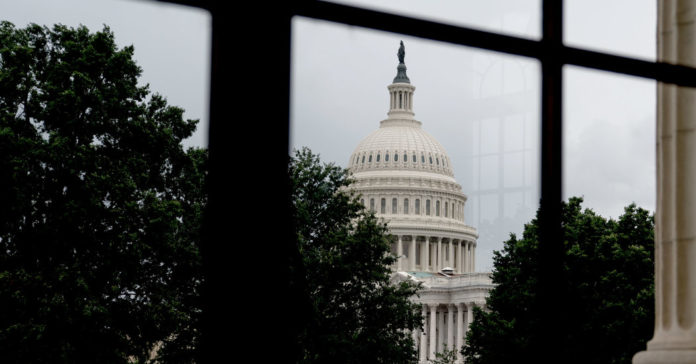(Want to get this briefing by email? Here’s the sign-up.)
Good evening. Here’s the latest.
1. A grim focus in the White House:
The morning after the conviction of Paul Manafort, his former campaign chairman, and a guilty plea by Michael Cohen, his former personal lawyer and fixer, President Trump monitored the headlines, sat for an interview with Fox News and discussed ways to try to seize the news cycle again.
But the legal setbacks — and the possibility that both defendants might cooperate with the special counsel — have all but collapsed the president’s attempts to dismiss the criminal investigations engulfing his tenure. Even Mr. Trump’s staunchest defenders acknowledge that he could be exposed to the possibility of impeachment.
2. The Democratic National Committee said it had warded off an attempt to hack its voter database.
The F.B.I. is investigating the attack, which the committee learned of this week, according to two officials. It was not immediately clear who was behind the hack. The committee was hacked in 2016 during the presidential election campaign, and the episode was later traced back to Russia.
“This attempt is further proof that there are constant threats as we head into midterm elections and we must remain vigilant in order to prevent future attacks,” said Bob Lord, chief security officer for the committee.
_____
3. Facebook said it had removed 652 fake accounts, pages and groups that were trying to sow misinformation.
The activity originated in Iran and Russia, Facebook said. Unlike past influence operations on the social network, which largely targeted Americans, the fake accounts, pages and groups were this time also aimed at people in Latin America, Britain and the Middle East, the company said.
_____
4. By one measure, the bull market hit a milestone — but most Americans aren’t at the party.
After 3,453 days, it ranks among the great booms in American market history. But as the stock market surged, prices for homes — the most important source and store of wealth for the American middle class — recovered much more slowly from the Great Recession and housing bust. Incomes, too, have barely budged.
One economics professor put it bluntly: “This is the decade in which wealth inequality has increased the most in U.S. history.”
5. For many consumers, the trade war with China will hit home this week, when the White House said it would impose a 10 percent tariff on another $16 billion worth of Chinese products. That will bring the total so far to $50 billion.
6. Saudi Arabia is seeking the death penalty for Israa al-Ghomgham, a 29-year-old female activist accused of encouraging demonstrations for Shiites, Human Rights Watch said.
The kingdom has one of the highest rates of capital punishment in the world. But calls to execute a woman in a case of nonviolent political crime are highly unusual.
The move contradicts Crown Prince Mohammed bin Salman’s efforts to brand himself as a reformer.
_____
Melanoma is more likely than most cancers to spread to the brain, and once it gets there, fewer than 20 percent of patients survive one year with traditional treatments, an author of the study said. But this treatment could help many more patients.
In other health news, you’ve probably heard all about the benefits of vitamin D. But what most Americans don’t know? The doctor whose enthusiasm for the supplement helped propel it to fame, above, has received hundreds of thousands of dollars from the vitamin D industry.
_____
8. Air pollution is shortening your life.
Months, and sometimes years, are being shaved off life expectancy, according to a new study.
Outdoor air pollution — fine particulate matter from sources like coal-fired power plants, truck tailpipes, wildfires and dust storms — reduces the worldwide average life expectancy at birth by one year, researchers found. The average Egyptian loses 1.9 years; the average Indian, 1.5 years; the average American, a little more than four months.
Many of the sources of outdoor air pollution are linked to greenhouse gas emissions, suggesting that moving to cleaner sources of energy could deliver public health dividends.
_____
9. Hawaii is bracing for Hurricane Lane, a Category 4 storm that forecasters say could bring whipping winds, flooding and high surf.
The state closed government offices, including public schools, on the Big Island and Maui, in anticipation of the storm, which has 155-m.p.h. winds.
For a brief period, Hurricane Lane was a Category 5, making it only the second storm at that strength to travel within 350 miles of Hawaii in the state’s history, according to the National Weather Service.
_____
10. Finally, the Netherlands is trying out a new approach to treat patients with dementia, including simulated beach scenes and other sensory aids.
The treatment harnesses the power of relaxation, childhood memories, family structure and other tools to heal, calm and nurture the residents.
It’s a sharp departure from the old prescription of bed rest, medication and, in some cases, physical restraints. And it seems to be making a difference: “It’s really about all the little things that make a normal life,” said one nurse.
_____
Your Evening Briefing is posted at 6 p.m. Eastern.
And don’t miss Your Morning Briefing. Sign up here to get it by email in the Australian, Asian, European or American morning.
Want to catch up on past briefings? You can browse them here.
What did you like? What do you want to see here? Let us know at briefing@nytimes.com.
Source : Nytimes












